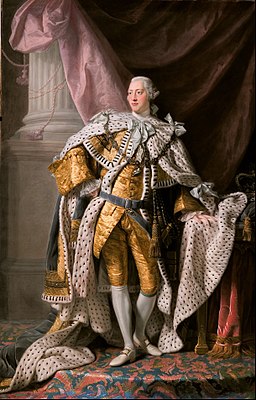A Royal Experiment: The Private Life of King George III

King George III in Coronation Robes
Quick, name two things you know about King George III of England.
If you’re an American, I’m pretty sure I know what you said:
He held the throne during the American Revolution. If you’re a history buff (and I assume you are), you may have added that on July 4, 1776 he wrote “Nothing of importance happened today” in his diary.*
He slipped into madness–a condition summarized by his addressing Parliament as “my lords and peacocks”.
In A Royal Experiment: The Private Life of King George III, Janice Hadlow presents a richer portrait of the king, showing him as son, husband, and father as well as ruler.
The Hanoverian kings of England were notorious for hating their heirs. They displayed that hatred in a public and often vicious fashion. Their heirs retaliated with equally public acts of political defiance. When George III inherited the throne from his grandfather at the age of 22 he was determined to build a family life different from the one he experienced as a child.
Hadlow begins with the three generations of Hanoverian royalty who preceded George III, describing dysfunctional family relationships that make soap opera plots look tame by comparison: loveless marriages, obsessive marriages, parents separated from their children against their will, a wife imprisoned for adultery (or at least considering adultery), a mother who refused to see her son on her deathbed. With that context in place, the heart of the book explores King George’s efforts to be the moral compass of his nation and to reconcile the values of domesticity with the demands of kingship–a noble experiment with mixed results and long-term consequences for the modern idea of monarchy.
A Royal Experiment will appeal to lovers of biography, Georgian England or royal scandal
* This quotation turns out to be another of the emotionally satisfying historical myths that shape our understanding of the past. King George didn’t keep a diary and the quotation should be attributed to Louis XVI on the day the Parisian mob stormed the Bastille. See the details here.
The guts of this review first appeared in Shelf Awareness for Readers.





Ha! Those are the 2 things I really remember. King during the revolution, and went mad. 🙂
As I said….